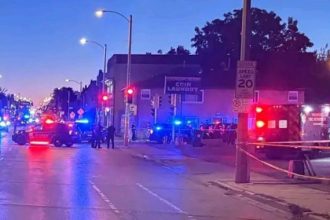Monica Butner, 58, of Person County, has been confirmed deceased after a harrowing incident involving floodwaters caused by Tropical Storm Chantal in North Carolina. The tragedy unfolded late Sunday evening when she was attempting to make her way to work in Orange County. While en route, her vehicle became trapped by fast-rising floodwaters on Wilkerson Road. She placed an urgent call to 911 seeking assistance, informing the dispatcher that her car was surrounded by water and that she was unable to escape.
The distressing call was cut short abruptly, indicating possible worsening conditions at the scene. That moment triggered an extensive multi-agency search effort that spanned hours and involved emergency personnel from several surrounding counties. The incident quickly became a somber reminder of the severe impact weather events can have on local communities.
Search crews located the vehicle early Monday morning near a small bridge along the road, partially submerged and pinned against debris. The area had experienced significant flooding due to relentless rain associated with Tropical Storm Chantal, which had been moving through the region over the weekend. The storm brought torrential rain, rising creeks, and flash flooding, affecting low-lying areas like Wilkerson Road.
Her body was located approximately 120 yards away from the vehicle, concealed beneath heavy debris that had accumulated along the banks of a swollen creek. Officials believe she had exited the vehicle in an attempt to reach higher ground but was quickly overtaken by the strength of the moving water. Recovery teams had to carefully navigate the hazardous terrain to retrieve her remains, which were later identified and confirmed by the Person County Sheriff’s Office.
Local authorities held a press conference Monday afternoon to confirm the tragic development. They expressed deep condolences to the victim’s family and reiterated ongoing warnings about the dangers of driving through floodwaters. Emergency officials emphasized that even shallow-looking water can be deceptively strong, capable of sweeping away vehicles and endangering lives.
Wilkerson Road, the location of the incident, is a rural two-lane route that crosses several creeks and is known to be prone to flooding during periods of heavy rain. Despite signage and repeated warnings from emergency management, several drivers each year attempt to navigate these crossings during storms. This particular stretch of road had already seen flood-related advisories over the weekend as the storm approached.
Tropical Storm Chantal has been responsible for widespread flooding throughout parts of North Carolina, particularly in areas like Person, Orange, and Alamance counties. Roads have been washed out, neighborhoods inundated, and emergency services stretched thin responding to calls for assistance. The storm’s impact has been especially severe due to saturated ground from previous rains, which limited the soil’s ability to absorb additional water.
Community members who knew the victim have expressed shock and sorrow, describing her as a dedicated worker and caring individual. Her absence is already being deeply felt among coworkers and neighbors who shared personal tributes on social media, recalling her kindness, dedication, and resilience. Though she lived in Person County, her daily commute to Orange County was part of her routine, and many are grappling with the reality that such an ordinary act turned into a tragedy.
Emergency management officials across North Carolina are using this incident to reiterate the motto often shared during hurricane and flood seasons: “Turn around, don’t drown.” The phrase is more than a catchphrase—it’s a lifesaving message aimed at preventing precisely these types of heartbreaking outcomes. According to the National Weather Service, most flood-related fatalities in the U.S. occur in vehicles. It only takes about a foot of moving water to carry away a small car, and just 18 to 24 inches to move larger vehicles like SUVs and trucks.
This incident is not isolated. Over the past decade, North Carolina has witnessed numerous flood-related fatalities, many of which occurred during attempts to drive through standing or moving water. In response, several counties have begun to install automated flood detection systems at high-risk crossings, which can trigger warning lights and even send notifications to emergency services when water levels become dangerous.
In this case, however, the lack of barriers or automated alerts on Wilkerson Road meant drivers had to rely on their own judgment and any public advisories available. The storm had intensified more rapidly than anticipated, catching even seasoned forecasters off-guard in certain parts of the state. Rainfall totals in the area exceeded five inches within a short span, overwhelming local drainage systems and turning rural roads into rivers.
As investigators review the timeline of events, they are working to piece together the exact circumstances of her final moments. What is known so far suggests she was doing everything right—she called for help, reported her situation, and likely tried to escape on foot only when she felt she had no other option. Despite her efforts, the water proved too swift and too forceful.
A family member shared that she had been working the same job for years and was known for her punctuality and reliability. The fact that she was attempting to reach work despite worsening conditions speaks volumes about her character and work ethic. Her story has struck a chord with many across the state, especially those in rural communities where commuting long distances in unpredictable weather is a common necessity.
The North Carolina Department of Transportation has since assessed the area and confirmed that road closures will remain in place until the water recedes and the structural integrity of the bridge and road can be evaluated. In the meantime, alternate routes are being recommended, and crews are working to remove storm debris and stabilize affected infrastructure.
Grief counselors have been made available to both the family and coworkers, recognizing the emotional toll such a sudden loss can have on those closest to the victim. Local churches and support groups are also stepping in to offer meals, assistance with arrangements, and emotional support.
In the broader context, the event has reignited discussions about storm preparedness and infrastructure upgrades. Rural areas, while scenic and peaceful, often lack the technological tools and emergency redundancies found in urban centers. As climate change contributes to more frequent and intense weather events, some officials are calling for updated floodplain maps, improved drainage systems, and expanded early warning tools tailored for rural roadways.
Though no life can be replaced, local leaders hope that this tragedy may inspire meaningful changes that could protect future lives. Already, there are proposals circulating to install additional signage and alert systems in flood-prone corridors throughout Person and Orange counties.
Neighbors and friends gathered Monday evening to hold a candlelight vigil near the bridge where her vehicle was found. Dozens of people braved the lingering drizzle to light candles, lay flowers, and share memories. The event was quiet, respectful, and emotionally charged—filled with both sorrow and the unspoken determination to never forget what happened and to prevent it from happening again.
Emergency responders who participated in the search and recovery operation also attended the vigil, some visibly shaken. For them, the work is never routine. Each call, each search, and each loss leaves its mark. Many of them reminded those present that the best way to honor the memory of those lost is to listen to warnings, avoid flooded roadways, and support efforts to improve safety measures.
As of Tuesday morning, Tropical Storm Chantal had moved offshore, but residual moisture and runoff continued to pose a threat. Additional flood warnings remained in effect for parts of North Carolina, with rivers and creeks expected to remain swollen for days. Cleanup efforts were underway in affected communities, but the scars of the storm—both physical and emotional—will take much longer to heal.
This loss has become a painful chapter in the broader narrative of Tropical Storm Chantal, a reminder of the storm’s power and the vulnerability that comes with even a momentary decision. In her honor, many are pledging to drive safer, stay informed, and support each other through storms—both literal and figurative.
Monica Butner’s passing is a loss not just to her family and friends but to the entire community. Her memory now becomes part of a larger conversation about safety, preparedness, and compassion in the face of natural disasters.




